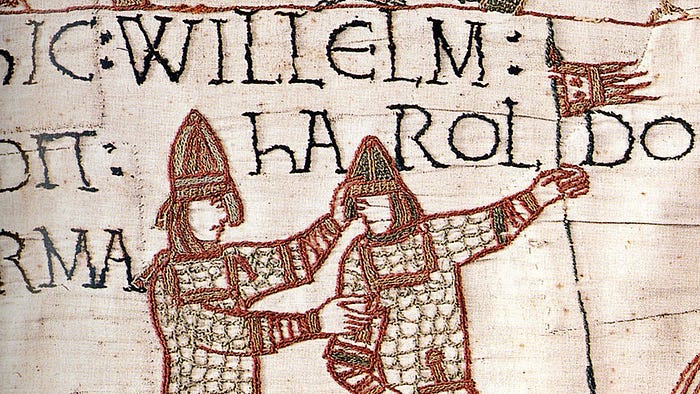The law is infamous for being exceptionally dry reading. Many non-lawyers find that famous judges known for their writing style and charm, like Oliver Wendell Holmes or Antonin Scalia, are merely readable. Others, like Felix Frankfurter, are inscrutable.
There are two common complaints about how the law is written. One is "legalese," or the frequent use of terms of art that mean so much more than what the words actually said. The other is the "legal doublet," where two or more words with identical meanings are used to say so much less than what they could have said.
Legalese has no excuse. The legal doublet, though, is a vestige of the very bygone era of the 11th century.
Legal doublets
The legal doublet is a collection of two or more words that are commonly used together, even though the words all mean the same thing. Some aggressively common legal doublets are:
- The contract is null and void
- He aided and abetted the fugitive
- She sold the land, part and parcel
- Each and every of the following terms in the contract
- The deceased leaves the rest, residue, and remainder of the property to his son
- The charge is for lewd and lascivious conduct
- Please read the terms and conditions
Broken apart, each word in the legal doublet has the same meaning. Give and grant means to give something to someone, and also to give something to someone. Cease and desist means to stop, and then to stop, again.
But lawyers aren't paid by the word. Why do these phrases exist?
It all started when William the Conqueror invaded Britain in 1066
In 1035, at the age of 7, William the Conqueror became the Duke of Normandy, the region of northwestern France right on the English Channel. When the king of England, Edward the Confessor, died in 1066, William the Conqueror — then just William — sailed across the Channel and invaded England. He killed the other major claimant to the throne, Harold Godwinson, in the Battle of Hastings and was crowned king of England on Christmas Day, 1066.
William the Conqueror and his House of Normandy ruled in England until their ouster by the House of Plantagenet in 1154, when Henry II was crowned king.
In the near-century of Norman rule, William and his descendants were very thorough in their consolidation of power, as shown by the Domesday Book — a meticulous tax assessment of all of the real estate in each English county. However, they didn't completely revamp the existing English government. Instead, they tweaked the English system and filled the important positions with Normans.
This meant that lots of important people — including lawyers and judges — traveled to England from France to help William the Conqueror control his newly-won lands.
One of the things that William did was change the official language from Old English to Latin. The influx of Normans from France to take important positions in England also meant that Norman French became the language of the rich and powerful.
To help facilitate communication between the speakers of these three different languages — Old English-speaking natives and French-speaking Normans, both having to use Latin in official government affairs — people, especially in the legal field, began using legal doublets. One of the words would come from one language, and one from the other. Both words meant the same thing, in different languages.
It helped everyone understand what was going on.
Saying "I give and grant this property for you to keep and maintain" worked for everyone. The English understood "give" and "keep," while the Normans understood "grant" and "maintain." Both sides could see that there was a transaction being made.
Over time, the doublespeak became common enough that lawyers began using pairs of nearly identical words because it was a normal thing to do. That's why some legal doublets, like cease and desist, are formed by two French words, while others, like to have and hold, have two English words.
But why are they still being used?
It's been nearly a thousand years since William conquered England and created the need for legal doublets, but they are still nearly ubiquitous today.
One reason is that many legal doublets use words that are very, very close to being identical, but still have a nuanced difference. To have and hold is one example because of the concept of constructive possession. You can still "have" a dollar bill if you deposit it in the bank. You no longer physically possess the dollar bill, but you still "have" it because it is in your constructive possession — it is where you can readily access it. But do you still "hold" the dollar bill once it has been deposited?
It's not so clear.
Another reason is that when lawyers could cover a potential situation by simply adding a word, they will do it, every single time. It's why so many contracts say things like, "this applies to, but is not necessarily limited to, the following," with a list of dozens of similar but minutely different circumstances.
When it comes to legal doublets, generations of lawyers have looked at duplicative phrases like aid and abet and decided that, in the end, it just wasn't worth the risk of losing their job to take one of them out.
They had student loans to pay off.


